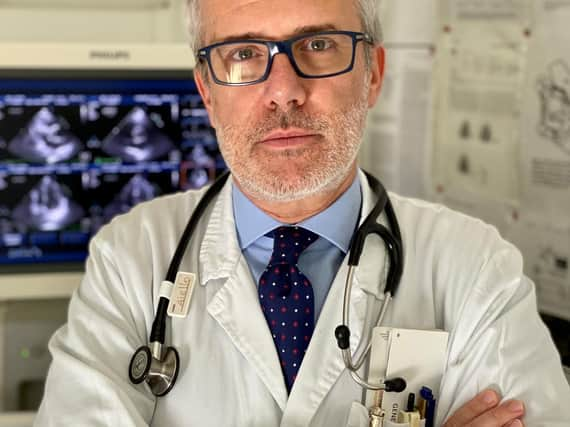Coronavirus: 'Rome looks like a post-apocalyptic city' - An Italian doctor's experience fighting the virus


My dad Furio keeps a bag in the booth of his car: inside it, the bare necessities - a tooth-brush, a clean shirt and socks - in case he gets stuck in the hospital overnight because of new cases of coronavirus.
He’s the director of a unit in one of Rome’s biggest hospitals and has been working 16-hour shifts since the whole of Italy became a ‘protected zone’, on Sunday night.
Advertisement
Hide AdAdvertisement
Hide AdThis means that no travel is allowed to and from Italy, other than special cases, and that citizens should stay home as much as possible, in order to prevent the virus from spreading even further.
“I feel like we’ve been besieged,” my dad tells me, “if you saw Rome right now, you wouldn’t recognise it.
“It looks like a post-apocalyptic city.”
Following an announcement of the Italian PM Giuseppe Conte on Wednesday night, all shops and restaurants in the country are now closed: only pharmacies, food suppliers and newsagents will remain open, until a new announcement is made.
And Rome, like the rest of Italy, is now silent, contemplating the sudden loss of normality and praying for the epidemic to pass.
Advertisement
Hide AdAdvertisement
Hide AdMy grandma - 86 years old and with a fiery temper - hasn’t been out of her house in almost two weeks.
She had to give up her daily stroll around Rome’s city centre and now paces her terrace back and forth, to get her daily exercise.
My mum gets her groceries and medicines, but leaves them on my grandma’s doorstep, just to be on the safe side.
Schools and universities all over Italy will be closed until April 3 at least, and there is a ban on travel within the country, except in extreme circumstances.
Advertisement
Hide AdAdvertisement
Hide Ad“I’ve been stopped by the police while I was driving back home from the hospital,” says my dad. “They can stop you and ask to certify your reason for travelling.
“I said I was a doctor and that I was going back home, and they let me go without asking any other questions.
“But people should avoid travelling at any cost, until the situation doesn’t get more bearable.”
Last night, some of my dad’s colleagues in Lombardy, the first northern region of Italy to be seriously hit by the virus, decided not to go back home to their families.
Advertisement
Hide AdAdvertisement
Hide Ad“They spent the night at the hospital,” he explains, “because they are worried they could infect their families with the virus.
“Every person infected with the virus usually transmits it to two or three other people, which is not a high number if you think, for example, of measles.
“A person infected with the measles virus usually infects around 25 other people.
“But the point is that this is an unknown virus, something we have never encountered before.
Advertisement
Hide AdAdvertisement
Hide Ad“This is a completely new epidemic and the situation is indeed very dangerous.”
Elderly and immunodepressed people are more at risk: 90 per cent of people who died from the virus in Italy were older than 65.
And the death rate in Italy, now close to six per cent, is already higher than in China, where around two per cent of people infected have died.
“As doctors, we are doing our job at the best of our possibilities,” explains my dad, “but Italian hospitals are now working at 120 per cent of their capacity.
Advertisement
Hide AdAdvertisement
Hide Ad“The big problem with the virus is that it causes serious respiratory failure and we don’t have enough ventilators to support an epidemic.
“This obviously causes the national health system to collapse.”
Many initiatives have been launched to donate money to hospitals all over Italy, in order to support the amazing work healthcare professionals have been doing since the outbreak of the virus.
Here in Preston, I observe the emergency from a distance, and I’m concerned because I’m not there to see the developments with my own eyes.
Advertisement
Hide AdAdvertisement
Hide AdBecause of the ban on travel, I don’t know when I’ll be able to see my family and friends again, like many other Italians living in the UK and around the world.
But today, more than ever, I’m proud to be Italian, because of the strength and resilience that my country is showing in such a difficult time.